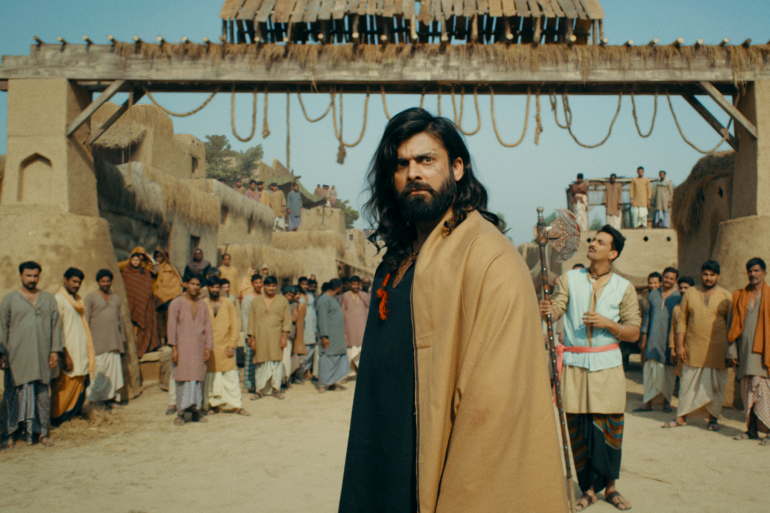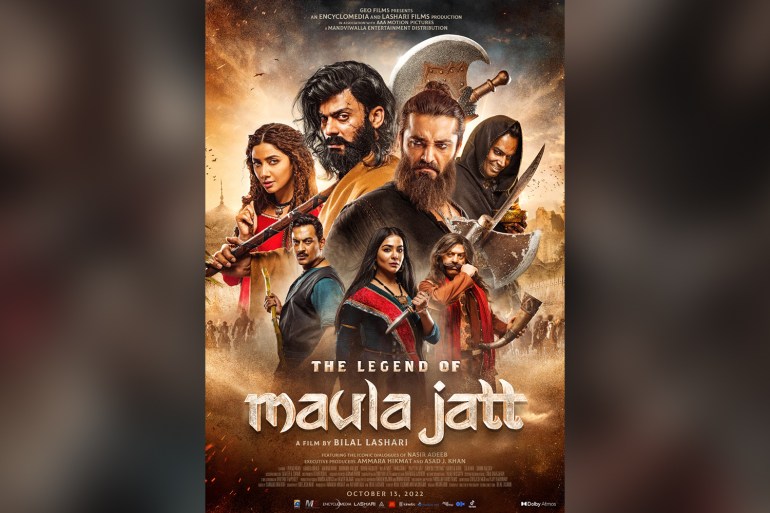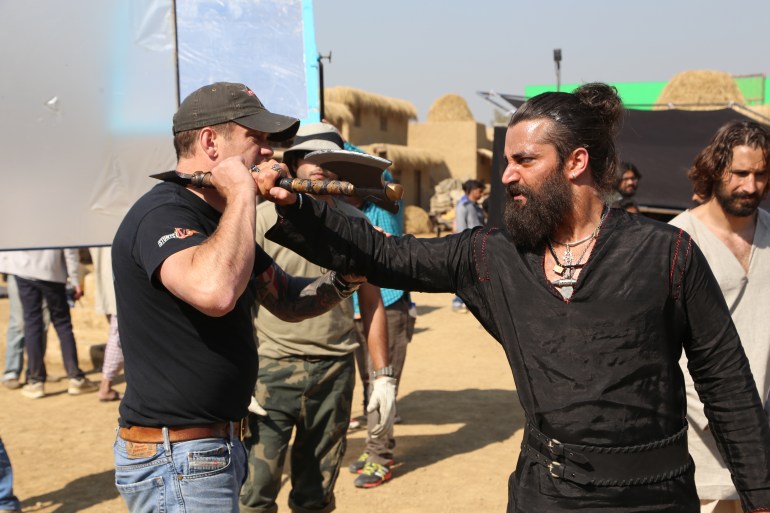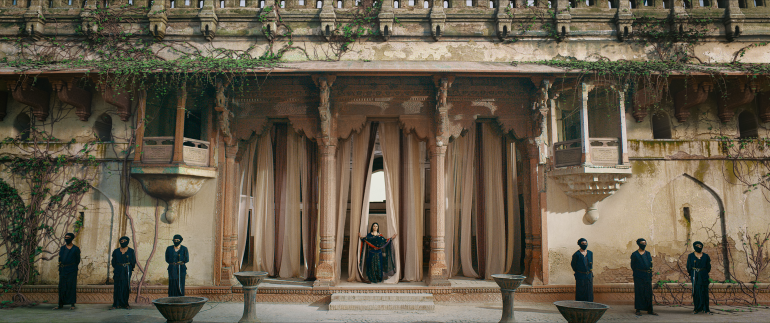Pakistani film The Legend of Maula Jatt sets a new benchmark
Writer-director Bilal Lashari’s The Legend of Maula Jatt, released worldwide, is Pakistan’s most expensive film ever.

Days before its October 13 worldwide release, the owner of the IMGC cinema hall in Pakistan’s provincial town of Burewala was working round-the-clock to get his new theatre ready for the much-anticipated action-drama film, The Legend of Maula Jatt.
“History is being made by this film,” said Sheikh Amjad Rasheed, adding that he wanted to be a part of that history.
Keep reading
list of 3 itemsJean-Luc Godard, iconic French New Wave film director, dies at 91
Purple Hearts is a terrible film — but it gets America right
The Legend of Maula Jatt, written and directed by Bilal Lashari, is Pakistan’s most expensive film ever, and its most ambitious.
It is also a remake of a hyper-masculine Punjabi film that changed the course of the industry 43 years ago, and the Pakistani film industry is hoping for its resurrection through this one.
“There are films that do better than other films, and then there are films that make an entire industry do better. This is going to be the latter,” Ammara Hikmat, the film’s producer, told Al Jazeera.
“I think it will change the way investors look at Pakistani films, and I hope filmmakers stop playing it safe after this.”
The film reportedly cost an unprecedented $4.6m to make in a country where the biggest films’ budgets have been below $1.5m. It earned $2.3m worldwide in its opening weekend.
Punjabi Gandasa
The Legend of Maula Jatt is based on a 1979 film titled just “Maula Jatt”. The story revolves around family feuds, a vigilante hero, an invincible villain, revenge and honour.
Its titular character is a gandasa-wielding Punjabi farmer in a world where moustachioed men on horses used gandasas (axes) and rifles to terrorise others and defend their own. The original film was banned by Zia ul-Haq’s government for “violence and subversive culture”, but it returned to the screens a few years later and spawned a gleefully violent and hypersexualised Punjabi film genre known as “Gandasa culture”, which prospered for nearly 20 years.
“A lot of countries have exported a certain style of cinema to the world, be it Hollywood’s Western, Bollywood with their musicals, samurai or kung fu films … ‘Punjabi Gandasa’ is a quintessentially Pakistani genre and I have revisited and reinvented that, given my own spin on it,” Lashari told Al Jazeera.
No cost, effort, creative input, or marketing strategy was spared to make a mark on international markets.

The film’s cast includes some of the country’s biggest stars and most respected actors. In an unprecedented move, it was released on 400 screens in 23 countries other than Pakistan. The production is slick, its scale grand, and its Gandasa action has the heightened drama and finesse of the best of Hollywood.
“Gandasa was and remains a weapon against injustice, a symbol of honour,” dialogue and scriptwriter Nasir Adeeb, who wrote the original Maula Jatt and the dialogue for The Legend of Maula Jatt, told Al Jazeera.
Maula Jatt became a cultural phenomenon, especially Adeeb’s dialogue and the actors’ performances and Mustafa Qureshi’s menacing but honourable bad guy, Noori Natt.

Lashari, 38, who is the writer, director, cameraman and editor of The Legend of Maula Jatt, doesn’t have a memory of watching the original while he was growing up but, like most people of his generation in Pakistan, has lived with it all his life.
“It’s deeply embedded in our popular culture. You hear the film’s dialogues at some dhaba, on TV, see graffiti somewhere, and politicians are often throwing those one-liners at each other,” he said.
Adeeb recalls former Prime Minister Benazir Bhutto using Noori Natt’s famous line: “Nawa aaya hai, Soneya [You must be new here, darling],” during a campaign rally, and her husband and former President Asif Ali Zardari saying, “Maulay nu Maula na maray tay Maula nai marda [Unless Maula kills Maula, Maula can’t die],” in response to a question about whether he faced any threats.
‘Goosebumps’
Lashari, whose 2013 debut film, Waar (The Strike), became the highest-grossing film in Pakistan at the time, says he took everything that made the original Maula Jatt a cult film and gave it a “hard reboot”.
He knew the kind of film he wanted to make, who would star and where it would be set – in an unknown time in a fantasy world he calls “Parallel Punjab”.
He dispensed with antiquated concepts like men settling feuds by marrying off their sisters, fleshed out archetypes by giving them compelling backstories, and amped up the Maula Jatt-Noori Natt enmity. He made detailed sketches of characters and scenes and rewrote the screenplay 80 times.
He knew the effect he wanted his film to have on the audience: “Goosebumps.”
Casting superstar and subcontinental heartthrob Fawad Khan as Maula Jatt was a goosebump-inducing move, as was casting Mahira Khan as the female lead.
“Everyone has seen that side of Fawad … the chocolate hero, the pretty boy side. But I knew that there’s something inside, you can say, controlled aggression. And in the new world, the concept of alpha isn’t necessarily beastly,” Lashari said.
News that Khan would face off with Hamza Ali Abbasi’s Noori Natt added to the pre-release excitement.
And the film arguably draws most of its power from the Natts.
Evil has never looked sexier, nor more thrilling. Abbasi’s Noori Natt is played with a near-religious intensity that’s in direct contrast with Gohar Rasheed’s campy, kooky portrayal of the younger Natt brother Makkha.
The Legend of Maula Jatt has a distinct aesthetic, the story unfolding in episodes, each introducing a character while moving the plot forward. As the film progresses, the plot thickens, the action intensifies, and tension rises.
“It is very Tarantino-ish, yet very Sergio Leone-ish. There’s a very Spaghetti Western feel to it,” Fawad Khan told Al Jazeera over a Zoom call.
Lashari’s rich, detailed imagination and meticulous execution give The Legend of Maula Jatt the heft of a blockbuster, but creating a fantasy on this scale was not easy in a country that doesn’t have world-class studios.
An action team had to be flown in from the UK to train actors and choreograph fight sequences. There were collaborations with technicians and VFX artists from several countries. A huge set was created in the village of Bedian, on the outskirts of Lahore.
‘Get a grip’
Most Punjabi films swear by patriarchy where women are relegated to playing hapless victims, titillating vamps or wailing mothers. While rooted in a similar milieu, this film’s human drama has street cred and women who openly express and pursue their desires.
Mahira Khan, one of Pakistan’s highest-paid actresses, told Al Jazeera that she was thrilled to play Mukkho in the film, a character who keeps hitting or hitting on men and breaks gender stereotypes.
“I used to be like: ‘God, Mukkho, get a grip,’ but Mukkho never got a grip,” she said.
“It’s so rare to find a female character in Pakistani, whether it’s cinema or TV, who is just slapping people around, kneeing goons in the balls, which I enjoyed thoroughly because I’ve never really done that in my life.”
Humaima Malik, who plays Daro, Noori Nutt’s beloved sister, said that Lashari asked her not to watch the original film and gave her one reference – Eva Green in 300: Rise of An Empire.
“He wanted Daro to be sensuous, confident, strong, horrifying, sexy, beautiful, dangerous all at the same time,” Humaima told Al Jazeera.
Her Daro inhabits a man’s world and in her opening scene, she walks in on a council of men in the palatial Nutt house and steals the show in a move reminiscent of O-Ren Ishii’s board meeting in Kill Bill I.

‘Anyone cuts anything in this film, I’ll resign’
Every few minutes in The Legend of Maula Jatt, someone threatens or demands that an enemy be chopped into kebab-size chunks. In other words, the violence is graphic.
“A big part of Gandasa films has been all these threats. ‘I’m going to do this to you, you’re this, that…’ So it can’t be all talk and no walk right,” Lashari said.
A source associated with the film told Al Jazeera that when they took the film to the censor board for certification, they loved the film and offered a Universal certificate, granting unrestricted public screening without the need for parental guidance.
“But one lady objected, saying: ‘What are you doing? Heads are being chopped off, sharp weapons are gliding through bodies… How can you?’ At which point the Censor Board chairperson threatened: ‘If anyone cuts anything in this film, I’ll resign.'”
‘I have asked them to decorate cinema halls like a bride’
The Legend of Maula Jatt was set to be released in 2020 coinciding with Eid but before that, the pandemic hit. But the delay has not diluted the excitement around the film.
Nadeem Mandviwalla, the distributor in Pakistan, is bullish about the film. “I have asked them (theatre owners) to decorate cinema halls like a bride,” he says.
At Lahore’s posh CUE Cinemas, 6,000 tickets were sold in advance. But some of Pakistan’s biggest theatre owners are not showing the film owing to new commercial terms, including producers’ revenue share of ticket sales.
Mandviwalla, however, is confident that the cinemas will come around.
In Gujranwala, Roxy Cinema held its first screening on Friday after remaining shut for more than three years because of a ban on Bollywood films amid India-Pakistan hostilities, and an unsustainable trickle of Pakistani movies – just 23 films in 2019.
Haji Tahir, the owner of Roxy, where the 1979 Maula Jatt played for several months, is banking on Lashari’s bold gamble and hoping that Maula Jatt will change the course of Pakistan’s film industry once again and his cinema will not go quiet again.